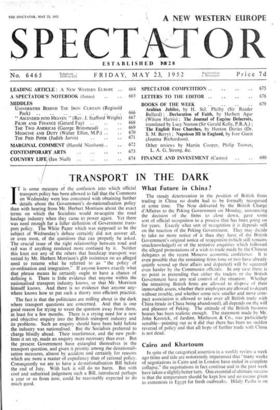Cairo and Khartoum
In spite of the categorical assertion in a weekly review a week ago (time and tide are notoriously impetuous) that "many weeks of negotiations in Cairo and in London have ended in complete collapse," the negotiations in fact continue and in the past week have taken a slightly better turn. One essential of ultimate success is that the temperature should be kept low and no excuse given to extremists in Egypt for fresh outbreaks. Hilaly Pasha is on the whole strengthening his position, and if he can carry on he may be able in time to move slightly nearer to a reasonable compromise that he can at present. It is a good sign that instead of returning a formal reply, which -would almost inevitably be unfavourable, to the last British Note he has preferred oral communication by Amr Pasha, the Egyptian Ambassador in London, to Mr. Eden, and by the Egyptian Foreign Minister to the British Ambassador in Cairo. The contents of the communications are not known, except that Egypt has made certain counter-proposals. Mr. Eden cannot consider these till he has got through a week crowded with European affairs, but there is no disadvantage in that; time in no sense presses. Meanwhile the projected visit of an unoffi- cial but influential Sudanese mission to Hilaly Pasha is to be welcomed. It is understood that substantial agreement has been reached between Cairo and London over the Canal Zone question. In regard to the Sudan we are pledged not to recognise any change in nominal sovereignty till the Sudan is independent and can decide for itself. If it should decide to accede to Egyptian wishes here and now there would be no reason for Britain to stand in the way. But it would have to be a perfectly free and voluntary decision.



































 Previous page
Previous page